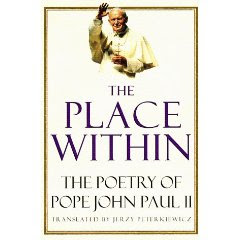
The truth is I read everything these days with a view to gaining insight about him. I'm on a personal quest to learn all I can about our Holy Father, Pope Benedict XVI, even to the extent of plugging the many holes in my German History education.
I found
I Am Bonhoeffer: A Credible Life two days after Christmas and purchased it with my Christmas gift card. Interestingly (since I don't believe in co-incidents) I picked the book up the same day our family went to see the new movie,
Valkyrie. Interesting as the movie is about the plot to kill Hitler which is the same reason Bonhoeffer was eventually arrested and executed.
Although this is a fictionalized biography, it is excellent. The writing is first class and the author's background as a journalist-historian tells in his tight, credible construction of plot, dialogue and character.
Barz also demonstrates an exceptional ability to develop and describe the evolution of Bonhoeffer's theological thoughts and beliefs which is precisely what I was looking for in this work.
‘I am Bonhoeffer. Fine. But who is that?’ On page 222 of Paul
Barz’s retrospective novel about the martyred German pastor we finally learn the significance of the title. Raised as a privileged prince, the youngest son in a large, loving, upper-class family, it may have taken imprisonment for Dietrich Bonhoeffer to really come to know himself. In any event, I am really looking forward to reading his
Letters and Papers from Prison to see if such proves to be the case.
I am Bonhoeffer specifically refers to Dietrich’s climactic realization that – like everyone else – he, too, can be stripped of wealth, title, position, family, love, freedom and yet something still remains. This novel begins in two places: at his arrival in Nazi prison in 1945 and his idyllic childhood. It continues to progress along the two rails of his journey through his life behind bars and his life of freedom growing up in the first half of the 20
th Century. The two separate ‘worlds’ are eerily juxtaposed as the final months of the Second World War drag to a close and Germany propels itself inevitably into cataclysmic ruin--all the while the young Dietrich is discerning his vocation, even at times his faith. Not his denomination necessarily, but his ability to believe, which according to those who knew him best,
didn’t always come easy; depending on your viewpoint a comforting or a disconcerting thing in one’s pastor.
He traveled to and lived in Italy, Spain, America, England and Switzerland. Each country and its people left a mark on him and his understanding of God, religion and worship. Italy was omnipotent grandeur, sound, smells and blue, blue skies. Spain was where he learned pastors are a kind of matador. America was Uncle Tom, Gospel music, and simple, emotional faith. England and Switzerland were places to help Jews to escape to, but not for him. Germany always drew him home.
I am Bonhoeffer tells more than just the story of one man’s developing maturity and ultimately heroic struggle against tyranny. It also gives some of the history of German Protestant Christian politics in the late 1920’s and through the 30’s and early 40’s. It’s easy to forget it’s a work of fiction; it reads like a well-written biography. Later when the Nazis came to power, it’s possible to trace the decline of the Church as a moral influence as well. Although far from a complete record of the time, as one witness to the era,
IaB is telling.
Though Bonhoeffer
couldn’t lie; his baby face and honest countenance
weren’t made for espionage, the conspirators to kill Hitler still found use for his very innocence.
If the book has a weakness, it’s that it fails to relate or even speculate how Bonhoeffer reconciled his Christian ethics with his own participation in treason and murder, even if the victim of the murder was Hitler. Many other peripheral issues were discussed such as: would/should he defend himself when the authorities came for him; was his head already on the same deathbed at the
Scholls, members of the “White Rose” resistance group executed while he was in prison; should he marry, did he deserve to, was he still of use in the normal world, etc. So perhaps he did not reconcile his own decision to kill the monster, Hitler, and yet felt it expedient and/or necessary for the greater good of mankind. This and other questions are left unanswered, as is the case whenever someone dies, but especially during wartime, and especially when the Nazis kangaroo try and execute the person in haste, in secret and burn the body.
Incredible book!
Check out my books on
Goodreads!

 This is definitely one for all students and Americans to see and remember!
This is definitely one for all students and Americans to see and remember!






